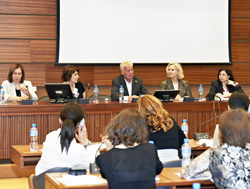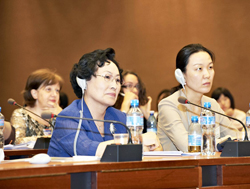2012 Switzerland
Middle Eastern Women's Voices at Human Rights Council 20th Session
CAROLYN HANDSCHIN AND ZOE BENNET
JUNE 27, 2012 - UNHQ GENEVA, SWITZERLAND
16th Annual Women's Conference for Peace in the Middle East
WFWPI held two side events during the 20th Session of the HRC. The 16th Annual Women's Conference on Peace in the Middle East (MEW) dedicated the first day of the three day conference to support the work of the HRC. Nearly 200 participants, the majority women, many under thirty, represented over 45 countries including many in the Middle East and North Africa. This group joined experts from UN bodies (UNICEF, UNRWA Palestine, OHCHR (Human Rights), OHCR (Refugees), Red Cross, International Organization for Migration (IOM), the International Labor Organization (ILO), United Nations Development Program (UNDP), United Nations Resident Coordinator (UNRC) Lebanon and UNESCO) and government missions based in Geneva to pool their best ideas and practices on the theme, Children affected by conflict and disaster: Prevention, protection, healing and empowerment.
Protecting children during conflict and tragedy: the roles of family, community, government and the United Nations.
Deputy Director of the UN Office for WFWPI, Ms. Carolyn Handschin, opened the session with the history of the MEW conferences. She introduced session chair, Ms. Saana M.M. Qormosh, UN Relief Works Agency (UNRWA).
Speakers included Mr. Patrick McCormick, UNICEF Spokesperson in Emergency situations since 1994. Having worked with child soldiers in several countries, Mr. McCormick described the tragedy of this vulnerable group, how it occurs and ways to prevent it. Sadly, he explained that some young boys join these gangs to escape difficult family situations. Dr. Josi Salem-Pickartz, Co-Director, Al Himaya Foundation for Trauma Recovery, Growth and Resilience, Jordan and representative for Make Mothers Matter (MMM) also pointed to the role of family, especially mothers in protecting, healing and changing destructive patterns.
Dr. Ghada Al-Jadba, UN Relief Works Agency (UNRWA) Gaza, Palestine reported on the situation in Gaza. "We couldn't save our past or present". Speaking of the children, she said, "let us save our future". Many UNRWA programs promotes non-violence; domestic violence awareness, trauma recovery through the arts and various women-supporting programs. Ms. Najjar Reem of UNICEF Jordan remarked that Gaza is one example from the region, there are many. She noted several programs successfully supporting raising children in such a difficult environment.
Mrs. Amal Ibrahim, English Literature teacher, Coordinator, Beirut Evangelical School, dealt with daily trauma of children in a society rife with sectarian violence. She explained realistic counter measures she implements in her classroom to diffuse aggressions.
A lively discussion ensued including questions about reintegration and healing for child soldiers. The UNICEF spokesperson described details of this tragedy, adding that many cannot escape their past. A participant told of a child soldier in Nigeria who inspires others with his story of disarmament, demobilization and reintegration. Participants shared best practices from women taking leadership to protect children, and prioritize education and community building over militarization. An activist from Egypt summarized, concerning the Middle East, "Our strength is our voices, in unison!"
Empowering young women for peacebuilding and conflict prevention.
The 2nd side event of the HRC organized by WFWPI attracted over 170 people. Carolyn Handschin, session chair, remarked that the theme is a central pillar of many WFWPI global programs. Confidence building in leadership capacities at an early age for girls, learned already at home, encourages a life of responsible citizenship and a good next generation of family.
The first presenter, WFWPI President, Professor Lan Young Moon described the work of WFWPI and women as bridge builders. The creation of the Global Women's Peace Network is a platform to facilitate an increase of women leaders in the world, a place to create solidarity and strategy. "Now is the right time for women to influence the world." The best UN programs will not bring our desired peace unless the capacity to care beyond barriers, as a mother can do, can be generated. Mrs. Kawther Al Jouan, prominent women's rights advocate from Kuwait encouraged all to learn from the younger generation, as she has discovered in her relationship with her son. "The burden of peacebuilding is on all of us". Sometimes we must, "close our mouths and open our minds."
The room was at capacity when HRC President, HE Laura Dupuy Lasserre arrived. Promising to join the meeting she described as "very important" once she had opened the afternoon session of the HRC, she addressed the participants. "During the last decades, Arab women leaders have played a crucial role in demanding a genuine change to implementation of international human rights standards on the ground. "Women and especially young women have played a very leading role in recent events and they need to be guaranteed continued opportunities to decide the future of their countries. Eager to speak to this group of women from the MENA region and explain the mechanisms of the HRC created to protect and support women's rights and empowerment, HE Lasserre stayed longer than expected.
The fourth speaker, Dr. Katrien Beeckmann, Head of the Principles and Values Department of the International Federation of Red Cross and Red Crescent Societies, has been developing programs for youth empowerment over years. She specified that education is one of three pillars of the Federation. Values-based skills should be taught in the family first. As a mother of a small daughter, she is amazed at the power of relationships within families to influence lives.
Ms. Sandy Michael Ayas presented a thoughtful PowerPoint, Empowering Young Women for Peacebuilding and Conflict Prevention: Syrian Crisis, relying on first-hand information about the current situation. She explained her targets: Strengthening collaboration with other peace-building actors, strengthening a base for sustainability of women's rights and empowerment, strengthening collaboration with other peacebuilding actors.
The World Organization of Women (WOW) UN Representative and intern, Mylene Jessia Lees provided insights into young women's problems in the Middle East as they aspire to influence the world around them. She expressed appreciation for the chance to give voice at the conference as a young woman discovering empowerment through her work at the UN.
Finally, Dr. Nurit Hirschfeld-Skupinsky, professor at a university in Israel and WFWP Israel president, spoke eloquently, circling back to the common thread throughout the messages, the role of love, sometimes referred to as "nurturing" or "healing", it is the critical element that is not easily passed on through UN mechanisms. It has often been asserted by individuals engaged at the UN, but not institutionalized. Yet it is empathy, self-sacrifice and living a life of responsible citizenship learned in the context of parental love and natural family support that assures empowerment and human rights a place in the culture of peace.


